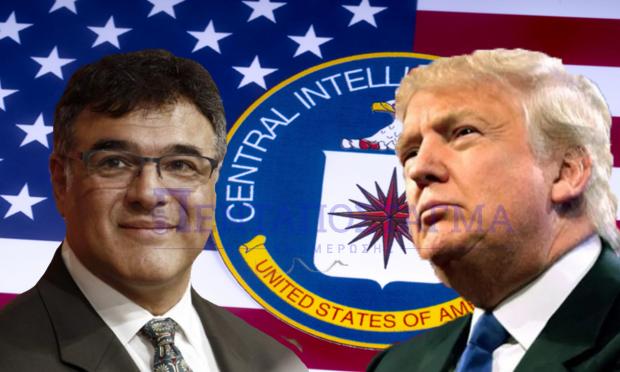John Kιriakou, a former Greek-American CIA officer-turned-whistleblower, writer and journalist, spoke with Pentapostagma about terrorism, refugees, the British-Turkish cooperation, the complex developments in the Middle East and about the future of modern espionage in general.
On February 28, 2013, John Kyriakou began serving a 30-month prison sentence after publicly blowing the whistle on the use of torture to CIA detainees, members of Al Qaeda.
He was previously a Central Intelligence Agency (CIA) analyst and case officer, senior investigator for the Senate Foreign Relations Committee, counterterrorism and a consultant for ABC News. He was the first U.S. government official to confirm in December 2007 that waterboarding had been used to interrogate al Qaeda detainees.
- As authoritarianism rises on a global scale, it seems harder and harder for whistleblowers, journalists and investigators to expose the crimes and wrongdoings of political and intelligence agencies. Where do you think this leads to?
I think that the rise of authoritarianism and the rise of populism is one of the most dangerous trends that Western countries face. Um, we've just dealt with it here in the United States. You look at the terrible situation in Brazil as another example, you see the fascist or neo-fascist movements active in places like Hungary and Poland and Germany and France, for a while, even Greece with, Chrysi Avgi (Golden Dawn).
Very very dangerous trends. And I think that these fascist and authoritarian regimes are possible because they masquerade as populist. You know, when you say, for example, "I support America first". Well, First of all, everybody supports America first in America.
Secondly, that's not really what this is about. It's not about America. America first is a code word for authoritarianism. And then when you have leaders like Donald Trump and Jair Bolsonaro and others who call the media, the enemy of the people, who look the other way when journalists are assaulted at political rallies, it only gets worse because the message being sent to the man in the street is that authoritarianism is good.
The authoritarian leader agrees with you and with your position on the issues. And if you want to take your anger at the system or at politics out on journalists it's okay. I think it's a very, very dangerous development.
- Since you blew the whistle on the CIA torture program and spent 23 months in prison for exposing this crime, similar cases made the front pages, such as Julian Assange and the Wikileaks Iraq War Logs, and Edward Snowden’s leak for global surveillance programs. Today, how vulnerable is an intelligence agency’s system to whistleblowers?
I actually think that they're less vulnerable than they were 10 years ago. And the reason is partly because of censorship and partly because of prosecutions under the Espionage Act. You know, espionage is one of the greatest crimes with which a person can be charged.
In some cases, it carries the death penalty. And when you have a government, at least here in the United States, and it doesn't matter if it's a Democratic president or a Republican one, but when you have a government that makes a determination that it is going to use a law like the Espionage Act to clamp down on whistleblowing and on national security leaks, the result at the end is that they frame would be whistleblowers. For example, a New York times reporter told me that οn the day of my arrest, every single one of the New York times, national security sources went completely silent and they stayed silent for about six months.
I say in speeches all the time, Vangeli, that the point really in my case was not to prosecute me - 23 months, big deal. I had an easy time of it - It was to frighten anybody else that might be thinking about blowing the whistle, you know, where the CIA could say, you want to go public? Look what we did to Kiriakou. He's broke. His family is in ruins. He'll never work again, which wasn't true, but that was the message. You want to be like him or do you want to just keep your mouth shut? And with the exception of Ed Snowden and Julian Assange, and a small handful of other whistleblowers, they kept silent.
The Julian case is unique and I, I feel very strongly about it. I serve on the Julian Assange Defense Committee here in the United States. Julian is a journalist and a publisher. And this is why it's so dangerous about organizations like the New York times and the Washington post, not rallying to, to Julian's defense, because if Julian Assange is convicted of espionage and is sent to prison for what could be the rest of his life, well, the Washington post and the New York times, national security journalists are going to be next. If Julian is convicted, what is to keep the FBI from breaking down the door at the home of any journalist who they deem to have leaked, classified information. I can't even imagine in contemporary America, a more dangerous development than the prosecution of Julian Assange.
It's a global problem. The obvious places are the United States and the UK - the UK, because it has the Official Secrets Act, which it's one of the most draconian national security laws that exists. But if you look elsewhere, you look at places like Australia or China or South Korea, or any of the former Soviet republics, their laws are just as bad, just as harsh and just as draconian.
- Terrorism is indeed an issue of grave importance and in the last few years a large spike on cases of terrorism is observed in Europe and the US. At the same time freedom of press is threatened by government and mass surveillance has become a “trend” for the West. Any comments on that?
Our government has always looked for an enemy, an enemy that the American people can rally against. At the turn of the 20th century it was communism, bolshevism. Later it became socialism. Then it became terrorism. We always need an -ism that we can identify as an enemy. This is a foreign concept, a foreign idea.
In fact, communism was no threat to the United States. Certainly socialism not only it was not a threat to the United States, but half of our programs are socialist in nature. But this is one thing that authoritarian regimes are very good at. They're very good at demonizing, a group of people, a minority, or demonizing a political ideology, and then maintaining their own strength by having people rally against that other group.
It's dangerous. It happened in the past. That's what led to the rise of Nazi Germany. And, and we see it rearing its head all the time here. We have to constantly fight it back. I'm thinking of the United States, but also of Brazil. I mean, we all see that the Jair Bolsonaro for example, is a crazy person. He's a madman. He wants to literally burn down the Amazon jungle to make it farmland, to make Brazil more competitive in exporting farm products. Well, we know that that's a terrible mistake. We know it's terrible for the environment, it's terrible for climate change and it's in the long run bad for the Brazilian economy. So what is the response from Jair Bolsonaro? It's not to debate the issue in the press or to debate the issue in parliament. It's to have the police crack people over the head with sticks and to to arrest people and throw them in prison with no trial until they give up.
And that's where this kind of thing leads.
- Greece, as the frontline of Europe and link to the East, has become “home” to many ISIS and Al Qaeda affiliated terrorists, and possibly extremist sleeper cells, since the massive immigration wave from Middle East started. What do you think should be done?
I think that Greece and the Greek government needs help from the European union mostly, secondarily from the United States, to be able to screen refugees.
The fact that Greece has taken in these refugees is a wonderful kind thing. Most of European countries wouldn't do it, but this is the whole concept of philotimo. You don't want people to die, to drown as they're on a dinghy coming from Turkey. You want them to, not that they stay in Greece necessarily, but you want them to be safe and fed and a good medical care, et cetera.
But then at the same time, we know that organizations like ISIS and Al-Qaeda are embedding in these groups of refugees in order to make their way to Europe. Greece has been very, very fortunate over the decades, aside its own domestic terrorism problem. Aside that it hasn't been on the frontline of these wars between Arab groups or having Arab groups come to Greece and launch attacks like we see in France, England, the Netherlands, Belgium.
But it's better to be safe than to be sorry. And I think that Greece needs to be even tougher in vetting refugees. And should not be afraid to turn refugees back. Look just between us and, and your listeners and viewers much of this is Turkey's problem. We know what the Turks do. We know that the Turks violate the Greek borders, that they violate Greek waters, the Greek airspace.
We know that the Turks push these refugees through on these boats and help them cross the border and send them to Chios and Samos and islands that are close to the Turkish mainland. This is a violation of international law. Greece can't go up against Turkey by itself. It needs help from both the European union and from NATO, and that helped needs to be forthcoming right away.
- The Trump administration seemed to focus on strengthening alliances in the Eastern Mediterranean region, including Greece, Cyprus and Israel, although it did not take action against Turkey and Erdogan. How do you think the US-Greek relations will be affected by a Biden administration?
Trump likes other authoritarian leaders and he admires the brute force, the strength that Erdogan has exhibited. I will say that even though for whatever crazy reason, Donald Trump liked SYRIZA - I don't know why, nobody did and he never explained it - I think that the democratic party and Joe Biden have a long history with Greece, a long close warm history with Greece and with Nea Dimokratia.
And I think that relations between the United States and Greece are going to be even warmer, even better than they were under Donald Trump. The leadership of the Greek American community, especially in New York, New Jersey, Massachusetts, along the Eastern seaboard, they have long had the ear of Joe Biden.
There are Greek Americans that, that I'm friendly with, who can pick up the mobile and call Biden and Biden answers. I've been in the room when they've met with Joe Biden. He has a love of Greece and of Greek people and of the Greek American community. And I think that this is going to be a very good thing for our relations over the longterm.
- Earlier this month, the new MI6 chief visited Turkey as his first official visit abroad. Does this mean that Britain and Turkey could form an intel alliance?
I didn't like that at all. The message is that we're with you, we support you and you don't have to worry about us. That's exactly the wrong message to send. Especially when Erdogan has launched a war on journalists, a war on dissidents, a war on his own military, especially when Erdogan has shown not just a willingness, but an excitement to send troops overseas.
There are Turkish troops fighting in Syria in Libya, in Nagorno-Karabakh. What's next? Kastellorizo?
I think a British-Turkish intel alliance is already formed and I think that they've had a liaison relationship for many decades. What is the most dangerous thing here is that Boris Johnson is also an authoritarian leader.
He's also a populous leader and I think that he feels a certain comradery with Erdogan. So I think that they're very comfortable dealing with each other and that's dangerous.
- Israeli Prime Minister Benjamin Netanyahu reportedly traveled to Saudi Arabia on Sunday accompanied by Mossad chief Yossi Cohen, where he met with Crown Prince Mohammad bin Salman and US Secretary of State Mike Pompeo. Since the Trump administration seems to focus on pressuring Iran before Joe Biden’s inauguration, do you think that this meeting is a harbinger of war against Iran?
No, I don't, I don't actually, I think that Donald Trump briefly considered an attack on Iran when he thought there was a chance he would lose the election and he was talked out of it. It would have been one of the worst ideas in the last century in foreign policy. I think what we're seeing though, is a outgoing president who's worried about his legacy. Donald Trump accomplished nothing in four years except to destroy our country and to tear it apart. And so he wants to be able to go down into history as having accomplished something.
That's why - and I find this very funny - here in the United States, the conservative media is calling this a peace treaty between the UAE and Bahrain on the one side and Israel on the other side. Well, the UAE and Bahrain were never at war with Israel. So you can't have a peace treaty where there was never a war. It's an agreement to open relations. Well, what would really be an accomplishment for Donald Trump would be if Saudi Arabia opened relations, but this is the same trap that president Jimmy Carter fell into in 1980.
The Saudis will never open relations with Israel so long as the Palestinians don't have a Homeland. Okay. With that said, and that aside the Israelis and the Saudis have been cooperating for years. They both hate the Iranians with a very special intensity and the Israelis know that the Saudis aren't going to attack them.
And the Saudis know that the Israelis aren't going to attack them. So on this one narrow issue of Iran, they cooperate. In 2015, there was an incident that happened that neither of Israelis, nor the Saudis would talk about publicly. But for a period of two hours, Saudi air defenses went down. They just shut off. No air defenses, no radar, no surface to air missiles, nothing. And then they came back on two hours later. Why would that happen? It's because the Israelis and the Saudis came to an agreement where the Israelis were going to fly fighter jets over Saudi territory to the UAE to see how quickly they could get there in the event that they needed to bomb Iran and then returned to Israel.
So it was a military exercise. It was a military exercise that Israel and Saudi Arabia cooperated on. Well, you don't need to have embassies in Riyadh, in Jerusalem to cooperate on these military and intelligence issues. So the status quo is actually pretty good for both countries.
I don't think that it raises the prospects of war. I don't think it does anything to the prospects of war. I think it's specific just to those two countries.
- Since the conventional tactics of spies are changing and modern warfare lies in a transitional level, can an intelligence agency nowadays cause or prevent a war? How much has the internet and cyberwarfare affected espionage?
Definitely. You can look at a million different developments in technology that could cause a war or conversely, prevent a war. I think it's easier to cause a war than to prevent one. If you look at artificial intelligence, for example, or the use or misuse of social media platforms or new methods of interception in electronic intelligence, there are things that NSA is doing or GCHQ is doing that are our minds can't even comprehend. So, yeah, I think it's easy to start a war and that it takes a human being to make sure that our intelligence services don't use technology to get us down a road that we can't turn around and get back out of.
The internet and cyberwarfare changed completely changed it. Utterly changed it. You know, when I was in the CIA we didn't use the internet. In fact, they only made the internet accessible after I had already been in the CIA for years.
So we used the old spy tactics, you know, dead drops and chalk marks on the sides of buildings and secret meetings, planned months in advance and old school spy tactics. Now you never even have to meet the person that you're handling or the person who's recruiting you, you just do everything over the internet and with encryption, it makes it that much easier.
It's crazy to think, but I think it's far, far easier now, both to recruit somebody and also to run a false flag operation than it ever was when I was in the CIA.

















